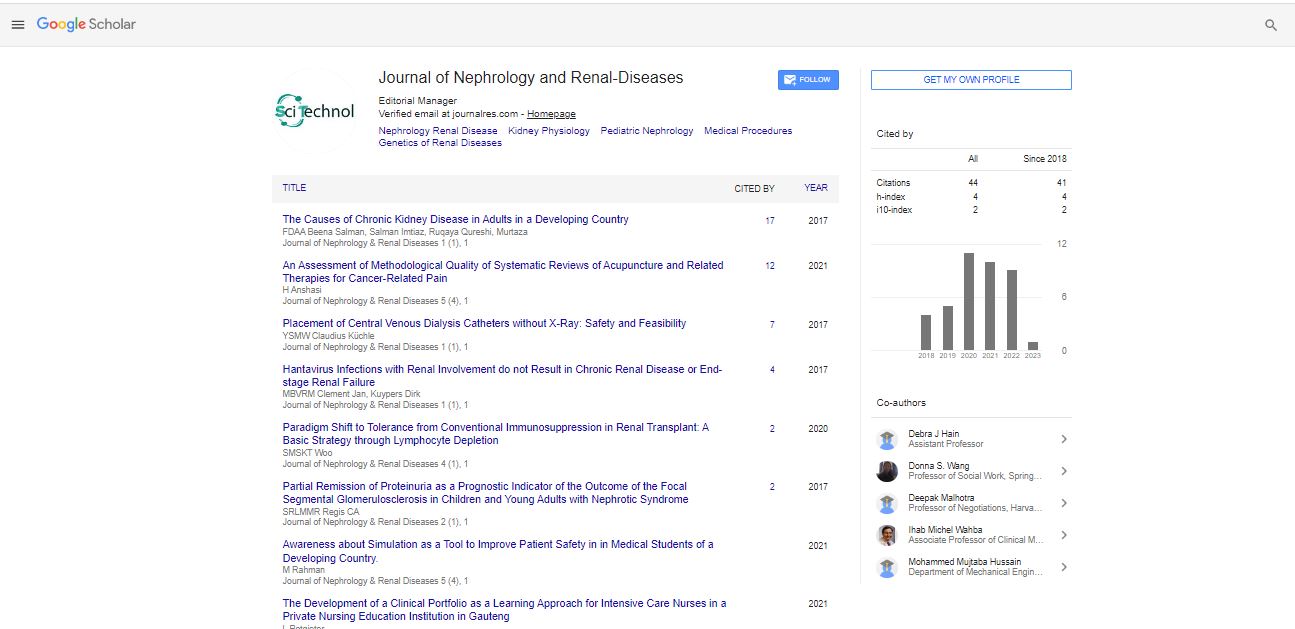Commentary, J Nephrol Ren Dis Vol: 7 Issue: 2
Fostering Renal Medicine for Kidney Disorders
Jerrilyn Ideris*
Department of Laboratory Medicine and Pathobiology, University of Toronto, Toronto, Canada
*Corresponding Author: Jerrilyn Ideris,
Department of Laboratory Medicine and Pathobiology, University of Toronto, Toronto, Canada
E-mail: jerrideri@smh.ca
Received date: 22 May, 2023, Manuscript No. JNRD-23-106990;
Editor assigned date: 25 May, 2023, PreQC No. JNRD-23-106990 (PQ);
Reviewed date: 08 June, 2023, QC No. JNRD-23-106990;
Revised date: 15 June, 2023, Manuscript No. JNRD-23-106990 (R);
Published date: 22 June, 2023, DOI: 10.4172/2576-3962.1000029
Citation: Ideris J (2023) Fostering Renal Medicine for Kidney Disorders. J Nephrol Ren Dis 7:2.
Description
Renal medicine, also known as nephrology, is a specialized branch of medicine dedicated to the diagnosis, treatment and management of kidney disorders. By understanding the principles and advancements in renal medicine, healthcare providers can deliver optimal care and improve patient outcomes for individuals with kidney diseases.
Renal medicine plays a vital role in maintaining kidney health and managing a wide range of kidney disorders. The kidneys are essential organs responsible for maintaining fluid and electrolyte balance, regulating blood pressure and eliminating waste products from the body. Renal medicine encompasses various aspects, including preventive care, early detection, accurate diagnosis and personalized management of kidney diseases.
Renal medicine focuses on promoting and maintaining kidney health through preventive measures. This includes managing modifiable risk factors such as hypertension, diabetes, obesity and lifestyle choices. Strategies for kidney health maintenance involve regular monitoring of blood pressure, blood glucose levels and kidney function. Additionally, education regarding a balanced diet, hydration and avoiding nephrotoxic substances plays a vital role in preventing kidney diseases.
Accurate diagnosis is essential in renal medicine to guide appropriate management strategies. Diagnostic approaches involve a combination of patient history, physical examination, laboratory tests, imaging studies and renal biopsy when necessary. Laboratory tests include measuring renal function markers (serum creatinine, estimated glomerular filtration rate), urine analysis and specific biomarkers (such as albuminuria, urinary protein-to-creatinine ratio). Imaging studies, including ultrasound, Computed Tomography (CT) or Magnetic Resonance Imaging (MRI), provide valuable information about renal anatomy and structure.
The management of renal conditions in renal medicine is multifaceted and often involves a multidisciplinary approach. Treatment modalities vary depending on the specific condition and its underlying cause. Conservative management strategies may include lifestyle modifications (dietary adjustments, weight management), blood pressure control and the use of renoprotective medications such as Angiotensin-Converting Enzyme Inhibitors (ACEIs) or Angiotensin Receptor Blockers (ARBs). Advanced renal replacement therapies like hemodialysis, peritoneal dialysis or kidney transplants are used in situations of end-stage renal disease.
Renal medicine continues to evolve with advancements in therapeutic interventions. The exciting developments include, use of targeted therapies for specific renal conditions, including immunosuppressive agents for glomerulonephritis or monoclonal antibodies targeting cytokines in autoimmune kidney diseases. Additionally, regenerative medicine approaches aim to restore kidney function through stem cell therapy or tissue engineering. Precision medicine, incorporating genetic testing and personalized treatment plans, is gaining importance in managing renal diseases.
Renal medicine emphasizes a collaborative approach involving nephrologists, primary care physicians, nurses, dietitians and other allied healthcare professionals. This multidisciplinary team works together to provide comprehensive care, educate patients about their condition and empower them to actively participate in their own healthcare. Patient-centered care is important in renal medicine, ensuring that individuals are well-informed about their condition, involved in treatment decisions and supported throughout the healthcare journey.
Renal medicine plays a vital role in diagnosing, treating and managing kidney disorders, contributing to improved patient outcomes and quality of life. The field encompasses various aspects, including preventive care, accurate diagnosis, personalized treatment plans and ongoing monitoring. Renal medicine is poised to benefit from novel diagnostic tools, targeted therapies and precision medicine approaches. By working collaboratively and focusing on patient-centered care, healthcare providers can make significant strides in the field of renal medicine and enhance the well-being of individuals with kidney diseases.
 Spanish
Spanish  Chinese
Chinese  Russian
Russian  German
German  French
French  Japanese
Japanese  Portuguese
Portuguese  Hindi
Hindi 
